Born on this date in 1961, defenseman Larry Murphy, played in 1,615 games over 20 NHL seasons and currently ranks 8th in career games played despite having retired 15 years ago.
After being drafted fourth overall in 1980, Murphy began his career with the Los Angeles Kings in 1980-81 scoring 16 goals and set NHL records with 60 assists and 76 points for a rookie defenseman.
After posting 66 and 62 point seasons in Los Angeles, Murphy would be traded early in the 1983-84 season to the Washington Capitals where he would continue to put up strong numbers, the best of which was in 1986-87 when he set a career high with 23 goals plus 58 assists for 81 points.
Murphy was dealt to the Minnesota North Stars along with Mike Gartner in a blockbuster deal for Dino Ciccarelli and Bob Rouse in March of 1989 after six seasons with the Capitals. After finishing up the 1988-89 season with Minnesota, he would play one full season with the North Stars, scoring 68 points, and then a half a season in 1990-91 before once more being traded, this time to the Pittsburgh Penguins.
The move to Pittsburgh would allow Murphy to experience a deep run into the playoffs for the first time in his career, never having made it past the second round during his ten previous seasons. As the Penguins progressed through the 1991 playoffs, they first defeated the New Jersey Devils in seven games, the Capitals in five and Boston Bruins in six, giving Murphy the chance to skate for the Stanley Cup against his former club, the North Stars. The Penguins dispatched Minnesota in six games, earning him the first Stanley Cup of his career as he contributed 23 points in 23 games.
In his first full season in Pittsburgh, Murphy scored 77 points in 77 games, thanks in part to the fourth 20 goal season of his career. He would add another 16 points in 21 playoff games as the Penguins would capture their second consecutive Stanley Cup.
The following season Murphy had his career best offensive season with 85 points and another 20 goal season with 22. After two more seasons with the Penguins, Murphy was dealt to the Toronto Maple Leafs for the 1995-96 season. His stay was not a long one however, as he was shipped to the Detroit Red Wings at the trading deadline during his second season with Toronto.
Murphy ended up playing more playoff games with Detroit than regular season games as the Red Wings charged through the playoffs that season and defeated the Philadelphia Flyers for the 1997 Stanley Cup, the third of Murphy's career.
Motivated by the injuries suffered by Vladimir Konstantinov while still celebrating their Stanley Cup victory in 1997, the Red Wings followed up that success with another championship in 1998, giving Murphy four Stanley Cup championships, and making Murphy the only player to win four Stanley Cups in the decade of the 1990's.
He would close out his career with three additional seasons with the Red Wings, which included playing 57 games in his final season of 2000-01, one of which was the 1,600th game of his 21-year career, only the second player to reach that mark after Gordie Howe. His final total of 1,615 games was an NHL record for defensemen at the time. He would complete his career with 287 goals and 929 assists for 1,216 points, third all time for defensemen when he retired behind only Ray Bourque and Paul Coffey.
In addition to his four Stanley Cup titles, Murphy also won a Memorial Cup in Canadian junior hockey with the Peterborough Petes.
Internationally, Murphy played for Canada in the 1980 World Junior Tournament and the 1985, 1987 and 2000 World Championships, earning a silver medal in 1985.
Murphy scored a goal and two assists in the final game of the 1987 Canada Cup as Canada took the championship. He was also a member of the championship winning Team Canada squad in the 1991 Canada Cup as well.
Today's first featured jersey is a 1982-83 Los Angeles Kings Larry Murphy jersey. The Kings wore this style from 1980-81 through 1987-88 until adopting the black and silver of the Los Angeles Raiders of the NFL.
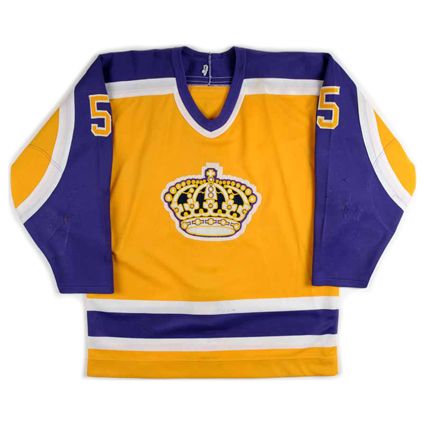
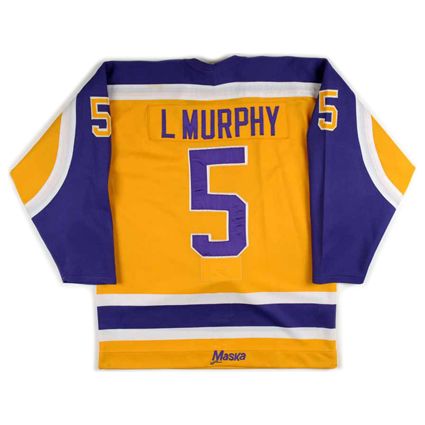
Today's second featured jersey is a 1987-88 Washington Capitals Larry Murphy jersey. The original style of Capitals jersey was used from their inaugural 1974-75 season through the 1994-95 season until the club changed to a new blue, white and black color scheme. This jersey would return in 2015-16 as a throwback alternate jersey.
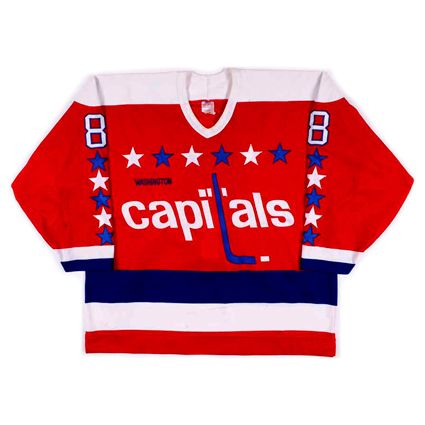
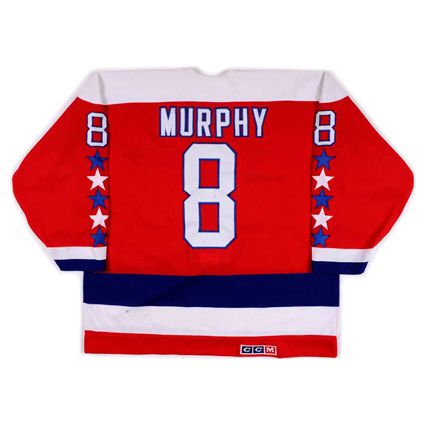
Today's third featured jersey is a 1989-90 Minnesota North Stars Larry Murphy jersey. One of the oddities of the North Stars jersey history, their white jerseys would receive the added black trim way back in 1981-82, but the road green jerseys did not get the same treatment of the added black until the 1988-89 season - seven years later! This style, finally with the added black stripes, would only be used from three seasons until a new look arrived for the 1991-92 season which saw the end of the green jerseys and the beloved N-Star logo.
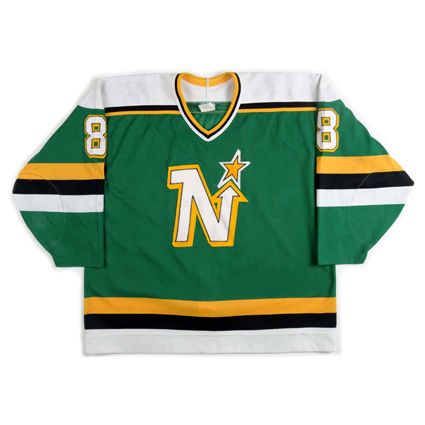
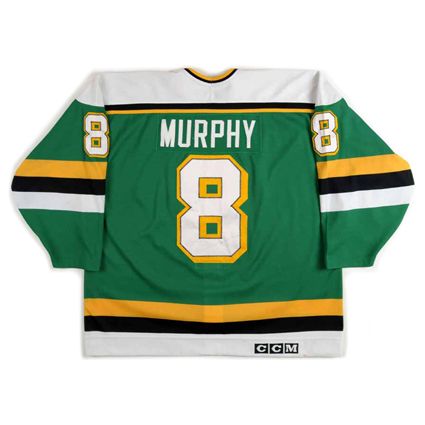
Today's fourth featured jersey is a 1994-95 Pittsburgh Penguins Larry Murphy jersey. After winning back-to-back Stanley Cups, the Penguins could not leave well enough alone and debuted a new pair of home and road jerseys for the 1992-93 season. This diagonally lettered jersey draws it's inspiration from the Penguins original jerseys from the 1967-68 season, which were lettered in the same manner and only lasted one season. This new black jersey would remain in used through the 1996-97 season.
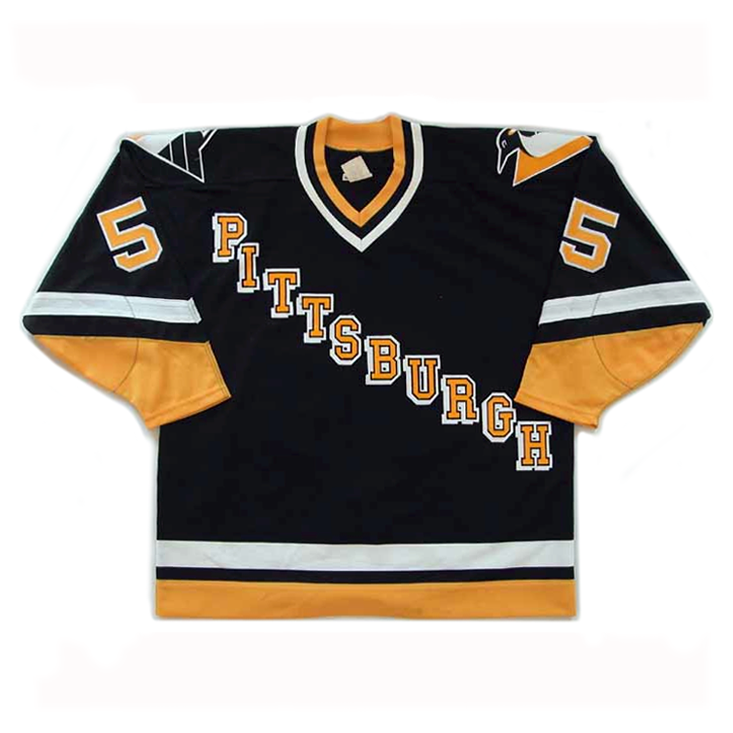
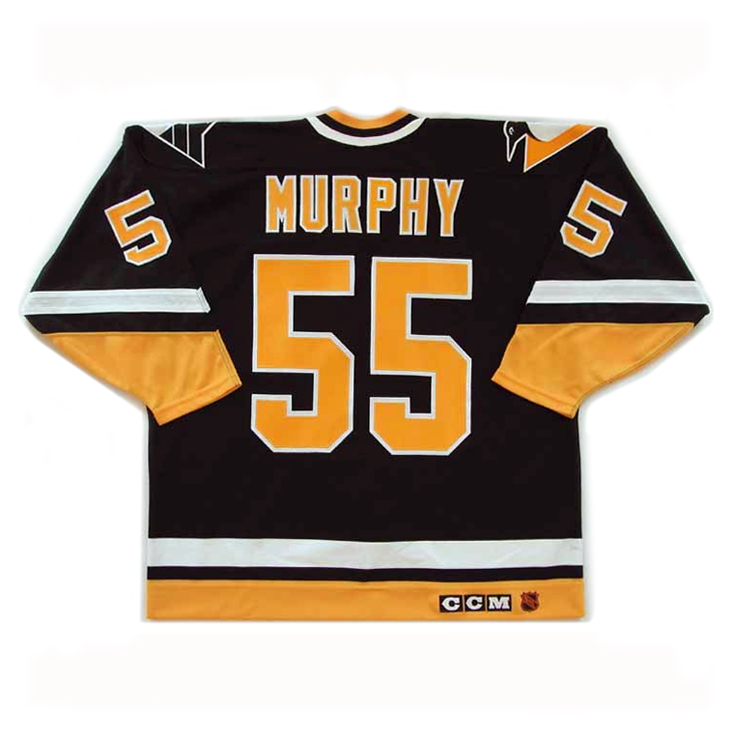
Today's fifth featured jersey is a 1996-97 Toronto Maple Leafs Larry Murphy jersey. After the success of their Turn Back the Clock jerseys used during the 1991-92 season on the occasion of the NHL's 75th anniversary, the Maple Leafs debuted this style for the 1992-93 season, which had the TBTC jersey's throwback leaf logo now used as this jerseys secondary shoulder patches.
The 1996-97 season, during which this jersey had the Maple Leaf Gardens 65th Anniversary patch, was the final season for this exact style, as the font for the name and numbers would change to an unfortunate modern font, which looked out of place on the otherwise classic jersey. Another font change, which included the addition of silver trim and a new shoulder monogram "TML" logo arrived in 2000-01. Eventually, the team would return to this style with the one color name and numbers in 2010-11 with the addition of a lace-up collar.
Today's sixth featured jersey is a 1999-00 Detroit Red Wings Larry Murphy jersey. The Red Wings debuted their first white jersey in 1934-35, with white arms adorned with a red stripe. They would change to red sleeves with a white stripe in 1961-62, which has remained essentially unchanged ever since. This jersey has the NHL 2000 patch worn by all teams in one of their colors.
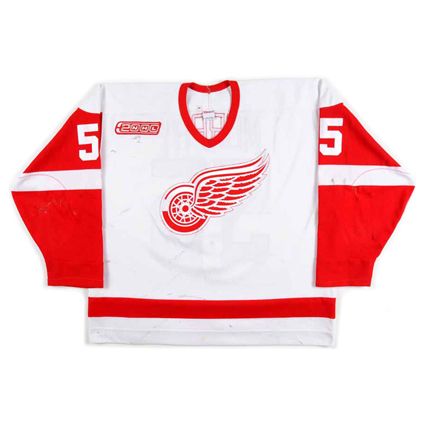
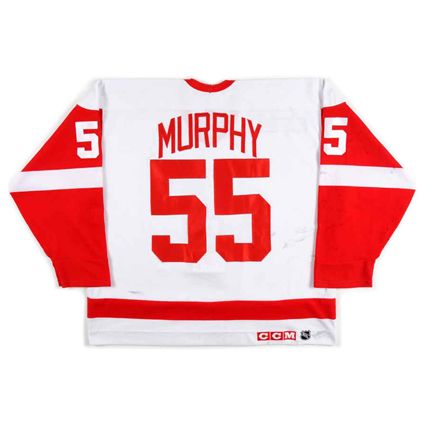
Today's first video is Murphy scoring his 1,000th NHL point while with the Toronto Maple Leafs.
Next, Murphy teaches you how to properly kill a penalty in a session of "Lessons with Larry".

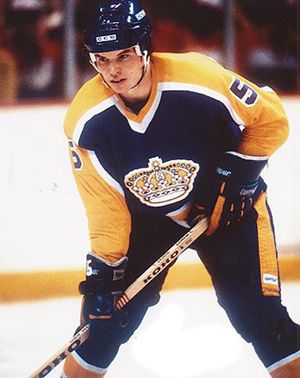
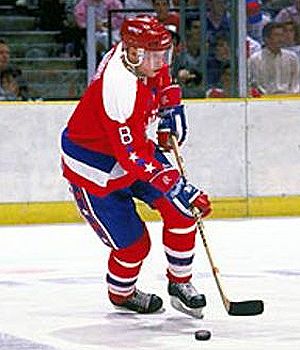
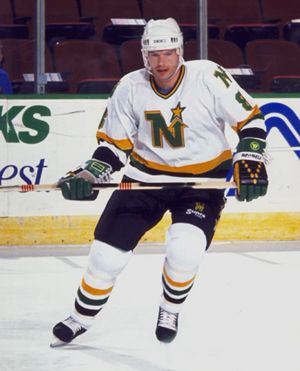
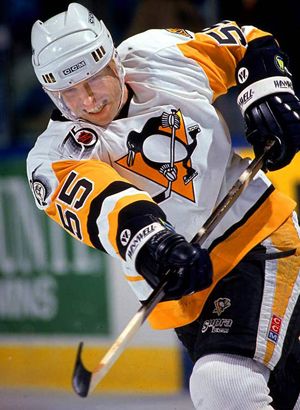 bdx
bdx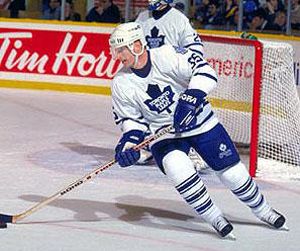
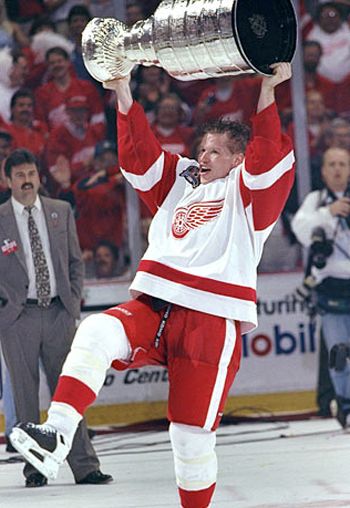








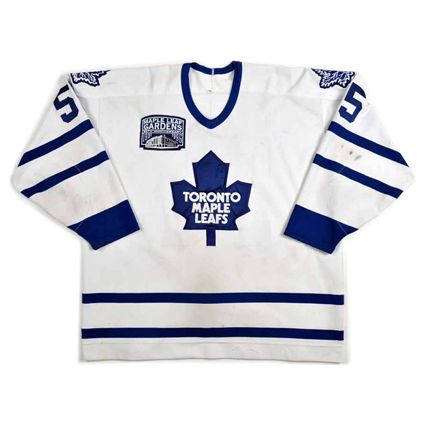
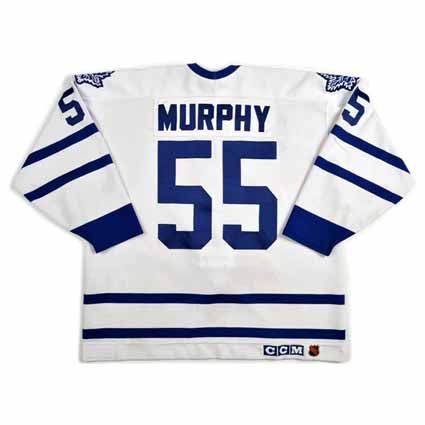












No comments:
Post a Comment
We welcome and encourage genuine comments and corrections from our readers. Please no spam. It will not be approved and never seen.